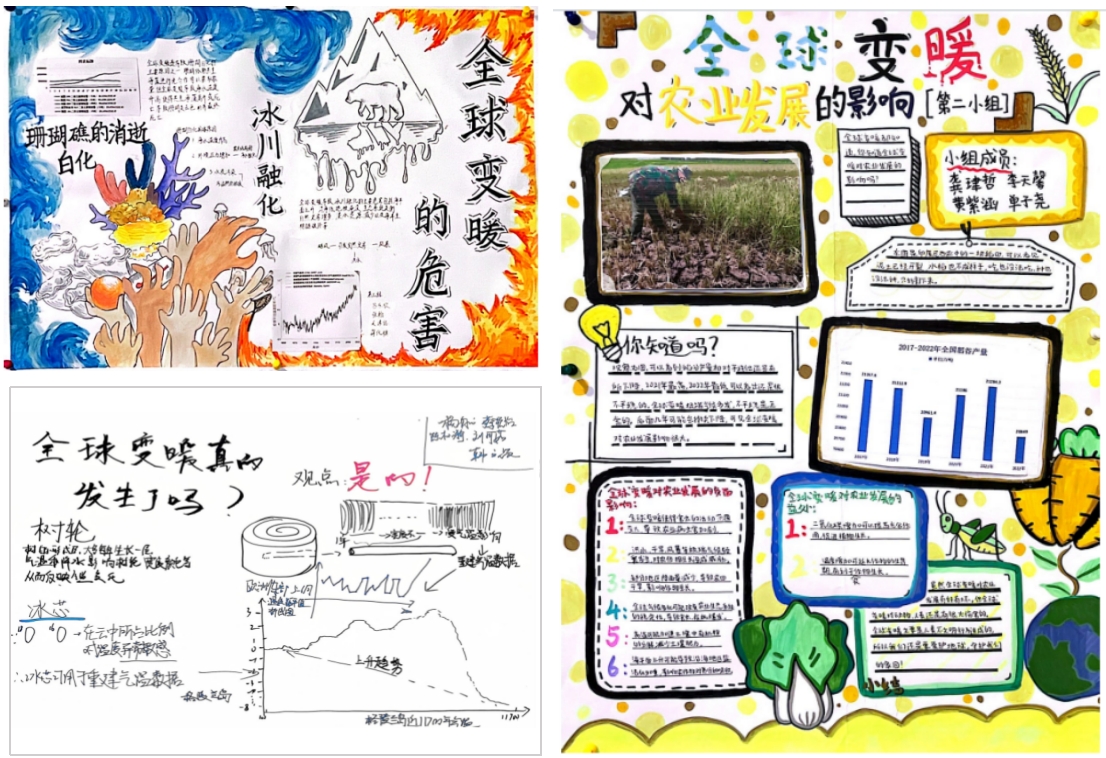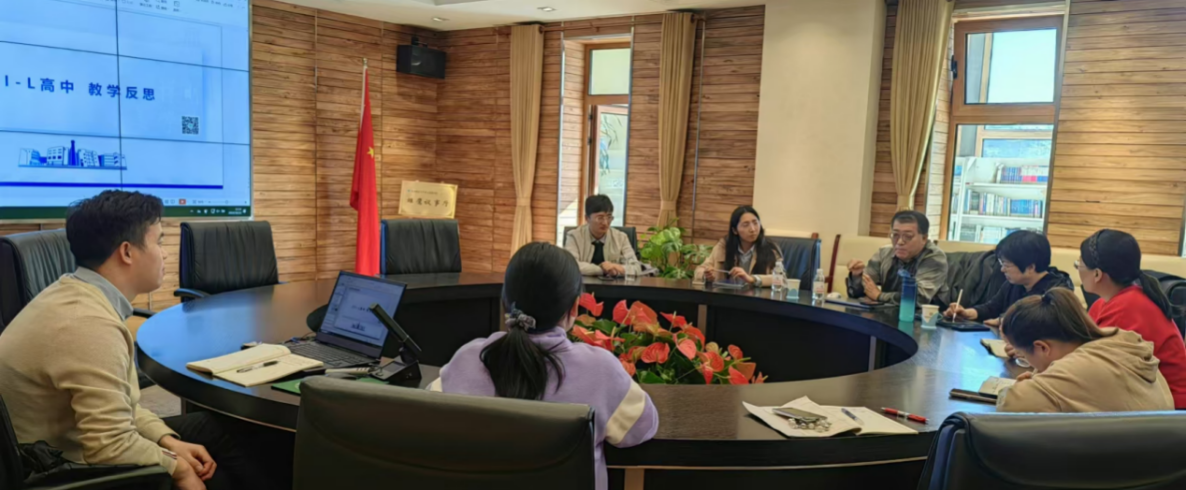近日,基础教育发展管理部“撷英计划”的重点项目——社会性科学议题学习的设计与教学模式研究项目,在中国基础教育质量监测协同创新中心林静老师主持下,在北京师范大学“社会性科学议题学习”项目办与两所项目校的共同努力之下,迎来了新的工作进展。该项目旨在探索并优化基于社会性科学议题的跨学科教学模式,为科学教育注入新活力。
一、成果初显:循证研究奠基项目推进
自项目正式启动以来,在北京师范大学附属实验中学和北京师范大学亚太实验学校成功完成了为期一学年的第一轮循证研究,取得了显著的阶段性成果。据第一轮施测数据对比显示,合作学校的参与学生在多个方面的认识与能力均有了提升,为项目的持续推进奠定了坚实基础。与此同时,教师也提升了教学专业能力与跨学科视野,提高以核心素养为本的育人水平,创新校本科学教育新模式,助力科学教育“加法”。
二、备课深化:分层备课保障教学质量
项目办团队每周进行细致的分学段备课,以确保教学内容的深度和广度、教学活动的有效性。与此同时,合作学校的教师们根据项目办提供的课程与教学资源、教学设计,进一步认真备课。授课结束后,项目办成员与合作校教师根据实际教学情况及学生的课堂表现进行研讨,及时发现教学过程中存在的具体问题,并据此提出相应的改进策略,进行二轮次的深度备课研讨。
三、教学实践:课程落地培养学生能力
在近两个月,北师大亚太实验学校与北师大附属实验中学成功实施了本学期SSI-L课程的两个单元的教学,分阶段发展学生将数据转化为证据、进行推理和反驳等科学论证技能,有效培养了学生的科学论证能力和探究技能,为后续的科学建模实践活动打下了坚实基础。学生在整个学习过程中被分成多个小组,围绕全球变暖的议题展开激烈的讨论。他们各抒己见,互相提问,不断激发新的思考和创意。课后,学生们仍然充满热情地讨论课堂上的内容,完成海报的设计,甚至在教学平台上继续交流,这样的学习氛围不仅极大地激发了学生探索科学世界的热情,还在潜移默化中提升了他们的科学思维能力。

学生课堂活动(亚太学校)

学生课堂活动(实验学校)

学生作品展示
四、研讨共促:月度研讨助力持续发展
为了及时总结教学经验并规划未来发展方向,项目组每月举行月度研讨活动。在这些活动中,SSI-L项目办成员与两所学校的项目组全体教师共同参与在线研讨,聚焦课程进展、教学现状以及未来计划,进行深入探讨。授课教师就课程实施过程中的问题与收获进行交流,其他与会教师与项目办成员也针对现场的问题及后续课程教学策略进行了深入交流与探讨。每一次月会上,项目负责人林静老师对课堂实施成效进行细致总结并提出针对性的改进建议。这些研讨活动不仅为项目的持续发展提供了有力支持,也为两所学校教师之间的交流与合作搭建了平台,碰撞出思想的火花。
五、专题研讨:内外合力提升项目质量
为进一步提升项目质量,项目办特邀台湾师范大学的张俊彦教授前往北京师范大学亚太实验学校参观交流。双方围绕SSI-L课程实施与虚拟实验室建设等议题进行了深入研讨。亚太实验学校SSI-L高中组教师董浩伟分享了《全球变暖》课程实施与学校实验室建设进展。林静教授对课程实施给予了反馈指导,张俊彦教授则提出了将虚拟仿真平台与实验室建设有机融合的建议。双方还进行了实地考察与策略研讨,共同探索SSI-L课程实施与虚拟实验室的共建之路。

实地考察与策略研讨:SSI-L课程实施与虚拟实验室的共建之路
随着新学期的开启,项目组与合作校教师秉持高度的教育热情,投入大量时间与精力,全力保障SSI-L课程的有效实施和学生科学素养的提升,以期培养出更多具备科学精神和社会责任感的未来社会栋梁。
Recently, the Socio-Scientific Issues Learning Design and Teaching Model Research Project, a key project within the Xieying Program at BNU’s Department of Basic Education Development Management, has made significant progress, led by Professor Lin Jing from the Collaborative Innovation Center of Assessment for Basic Education Quality at Beijing Normal University and with the collective efforts of the Beijing Normal University Socio-Scientific Issues Learning Project team and the two partner schools. The project aims to explore and optimize an interdisciplinary teaching model based on socio-scientific issues, injecting new vitality into science education.
1. Initial Results: Evidence-Based Research Laying the Foundation for Project Advancement
Since the official launch of the project, the first round of evidence-based research, conducted over one academic year at the Experimental High School Attached to Beijing Normal University and the Asia-Pacific Experimental School of Beijing Normal University, has been successfully completed and yielded significant initial results. Data comparisons from the first round of implementation testing show that students in the partner schools have made improvements in multiple aspects of understanding and abilities, which provides a solid foundation for the ongoing advancement of the project. Simultaneously, teachers have enhanced their professional teaching abilities and interdisciplinary visions, improved their capacity for core-literacy-based education, innovated school-based science education models, and contributed to the "enhancement" of science education.
2. Deepening Course Preparation: Layered Course Preparation Ensuring Teaching Quality
The project team conducted detailed course preparations by schooling phase every week, to ensure the depth and breadth of teaching content and the effectiveness of teaching activities. At the same time, teachers at the partner schools planned out their courses based on the curriculum, teaching resources, and instructional designs that have been provided by the project team. After class, project team members and teachers from the partner schools engaged in discussions in accordance with the actual teaching conditions and student performance in class. They promptly identified specific problems in the teaching process, proposed corresponding strategies for improvement, and made the second round of in-depth course preparation and discussion.
3. Teaching Practice: Course Implementation for Student Skill Development
Over the past two months, the Experimental High School Attached to Beijing Normal University and the Asia-Pacific Experimental School of Beijing Normal University have successfully implemented two units of the SSI-L curriculum this semester. These units focus on the phased development of students' abilities to transform data into evidence, to reason, and to refute scientific arguments. This has effectively fostered students' scientific argumentation abilities and inquiry skills, laying a solid foundation for future scientific modeling activities. During the learning process, students were divided into small groups and engaged in intense discussions on the issue of global warming. They expressed diverse opinions, asked each other questions, and constantly sparked new thoughts and ideas. After class, students continued to discuss the course content enthusiastically, designed posters, and exchange ideas on the teaching platform. This learning atmosphere not only greatly stimulated students' passion for exploring the scientific world but also subtly enhanced their scientific thinking abilities.
4. Collaborative Discussions: Monthly Seminar Discussions Facilitating Sustainable Development
To promptly summarize teaching experiences and plan out future developmental directions, the project team has held monthly seminar discussions. During these activities, SSI-L project office members and the entire teaching teams from two partner schools participated in online discussions. They have focused on curriculum progress, the current state of teaching, and future plans, and engaged in in-depth discussions. Teaching staff exchanged insights on challenges and gains encountered during curriculum implementation, while other participating teachers and project office members delved into and discussed issues raised during the seminars and subsequent teaching strategies. At each monthly meeting, the SSI-L project leader Lin Jing would provide detailed summaries of curriculum implementation outcomes and offer targeted suggestions for improvement. These seminars have not only provided strong support for the sustainable development of the project, but also established a platform for communication and collaboration among teachers from the two partner schools, sparking new ideas and perspectives.
5. Specialized Seminars: Joint Collaboration from the Internal and External to Enhance Project Quality
To further enhance the project quality, the project office invited Professor Chang Chun-Yen from National Taiwan Normal University to visit the Asia-Pacific Experimental School of Beijing Normal University for an exchange. Both sides conducted in-depth discussions on topics such as SSI-L curriculum implementation and virtual laboratory construction. Dong Haowei, from the high school team of SSI-L project at the Asia-Pacific Experimental School, shared the implementation of the "Global Warming" curriculum and the progress of the school's laboratory construction. Professor Lin Jing provided feedback and guidance on the curriculum implementation, while Professor Chang Chun-Yen proposed integrating the virtual simulation platform with laboratory construction. The two sides also conducted on-site visits and strategic discussions, jointly exploring the co-construction pathways for integrating SSI-L curriculum implementation with virtual laboratory.
With the start of the new semester, the project team and teachers from partner schools, driven by a strong passion for education, have dedicated substantial time and effort to ensure the effective implementation of SSI-L curriculum and the enhancement of students' scientific literacy. Through these endeavors, the project expects to nurture more future leaders with a strong sense of scientific spirit and social responsibility.
